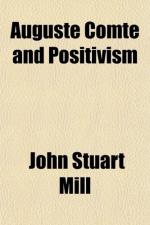|
This section contains 17,215 words (approx. 58 pages at 300 words per page) |

|
SOURCE: Review of Cours de philosophie positive, in The Edinburgh Review, Vol. LXVII, No. CXXXVI, July, 1838, pp. 271-308.
In the following review, Brewster outlines a "sketch of the objects and methods of positive knowledge," focusing especially on Comte's theism and cosmology
The competitors for the honours of science may be divided into several classes, actuated by very different motives, and pursuing very different objects;—those who investigate by observation and experiment the phenomena and the laws of nature; those who arrange the facts and expound the doctrines of science; those who record at different epochs the history of its progress; and those who attempt to explain the mental progresses by which discoveries have been made, and prescribe for every branch of knowledge the most appropriate methods of research.
Though the love of posthumous fame supplies these different classes with their earliest and their strongest impulse, yet this principle...
|
This section contains 17,215 words (approx. 58 pages at 300 words per page) |

|


